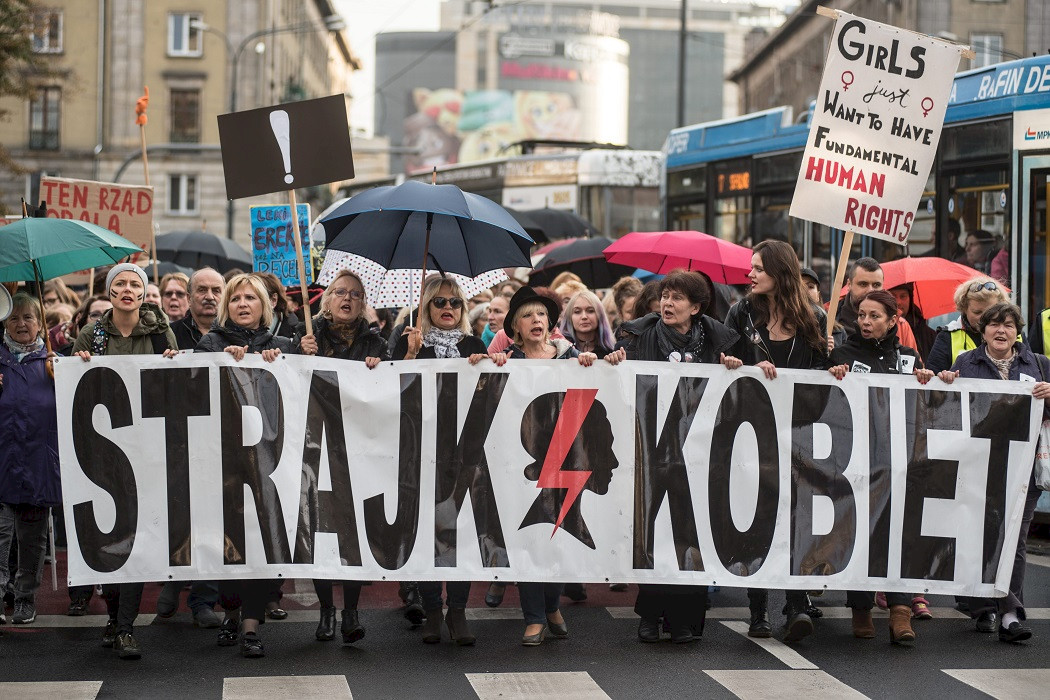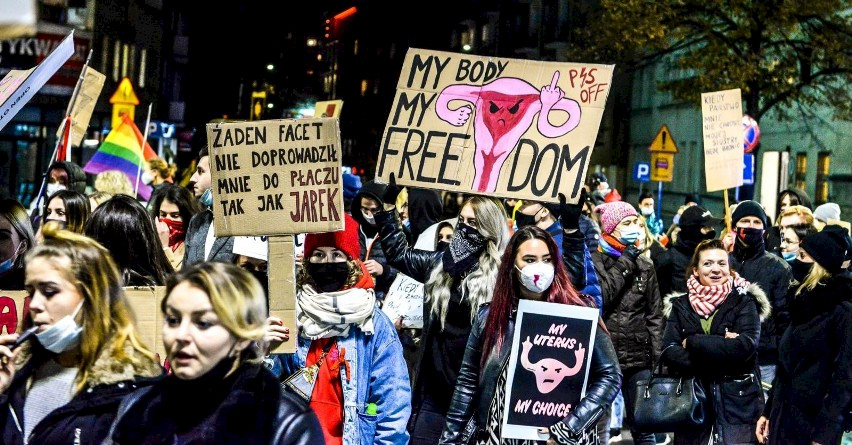Lidka Makowska speaks to Ophélie Masson on lessons learnt from the Wom*n’s Strike in Poland
We as activists, organizers, and educators know very well that racism and migrants’ experience interact with other fields of struggle such as gender and LGBTQIA+, class differences and labor relations, and climate justice. Being aware of this allows us to struggle more effectively against discrimination, exploitation, and violence.

Credits: Strajk Kobiet

Credits: Strajk Kobiet
My engagement with such an intersectional approach started 15 years ago in the context of the struggle for women’s rights in Poland. The political transformation with Lech Walesa and the Polish Solidarity (Solidarność) trade union movement, in 1989, was strongly influenced by Catholic bishops. The political position of the Catholic Church, connected to the ‘holy icon’ of the Polish Pope John Paul II, was very firmly rooted and spread out in our society. The patriarchal system has demanded Polish women to obey the 3K rule – “Kinder, Küche, Kirche” (children, kitchen, church).
That religion-based patriarchy could no longer be maintained. It started to change in 2004 when Poland became a member of the European Union. At that time, a lot of feminist groups were born in the whole country, and more and more were active in changing the conditions of women’s lives. The feminist movement here was mainly concentrating on the fight for legal access to abortion, as it was forbidden by the Catholic Church. But despite all of the years spent on fighting on marches and occupations, with petitions and social media campaigns, Poland is now still one of only three countries in Europe, together with the Vatican and Malta, that apply the most oppressive laws against the right to abortion.
This ‘failure’ – or a lack of a strong win for the movement – made me aware that we need an extraordinary mobilization of a powerful intersectional feminist movement in order to achieve our goal. This intersectional approach worked in practice in October 2020, as the Polish Women’s Strike broke out. First, the point was to prevent the abortion ban and to legalize abortion. But immediately it became clear that thousands of people went to protest on the streets against the Polish far-right government. The protesters had the slogan: ‘It’s about everything!’
The Feminist Struggle in Poland – Yesterday, Today, and Tomorrow
The ‘Strajk Kobiet’ (Women’s Strike) two years ago showed us very clearly that feminism must be intersectional, including all discriminated groups because of gender/sex, age, disability, ethnic origin, LGBT+ identity, religion/non-religion, poverty, and social exclusion. Feminism should obviously also be about the fight against climate change and in solidarity with non-humans and animals, all living beings in fact. This is the kind of feminism I believe in.
Some people might say: ‘It is too much! Everything is mixed up! You should concentrate on one priority.’ This is the narrative we are hearing from all directions. From my activist and educational experience, I can say: That is not true. Activist single-issue movements with only one goal have no chance anymore to be successful in changing the world, in achieving their goal. Only if we unite our different struggles, communities, and movements, we can win. As we all together need to be the change, we want to see in this world – not just some of us being privileged to represent one particular struggle.
In Poland, we now face a very dangerous situation with a government of far-right politicians in power attacking women* and the most vulnerable with draconian measures – not very different from what intersectional feminists in the United States of America are nowadays fighting against. ‘Our’ right-wing politicians here are – like Putin in Russia – ‘going to war’ against us. And yet, we are so close to the war in Ukraine already trying to take care of women*, children and elderly persons fleeing to our country to find safety. It’s up to all of us to fight for the right to body self-determination, access to healthcare and social services, and reproductive justice beyond the borders of national origin and place of residence. Therefore, I am deeply convinced that we should spread and develop – all across Europe – by all means necessary – alliances and coalitions towards a truly intersectional approach connecting struggles and movements beyond the divisions which are being put upon us. This is especially relevant before the next European elections in 2024.
How to Enact an Intersectional Approach within Our Daily Political Praxis
In order to enact an intersectional feminist movement practice beyond borders, I want to share my experience-based list of lessons learnt from my involvement in the feminist movement in Poland:
- Let’s understand our different oppressions, issues, and struggles as interconnected – within and between us – and be vulnerable and brave.
- Let’s be aware of the invisible power structures and hierarchical and paternalistic dynamics also affecting our communities.
- Let’s listen and speak with empathy according to the principles of nonviolent communication allowing differences to be expressed.
- Let’s continuously work on ourselves, raise our awareness, and develop capacities for responsible and resilient movement leadership.
- Let’s not fight each other but respect our needs, desires, and resources in order to make the most vulnerable feel physically and emotionally safe in our spaces.
- Let’s raise our consciousness for our allies and how we could inspire, empower and support each other, as we are not alone in this, but together.
- Let’s not be afraid to ask questions that need to be asked and to raise issues, conflicts, and decisions that need to be addressed.
- Let’s be aware of the fact that our struggle may have unintended negative impacts on us and on others, and be sensitive, open and honest about it.
- Let’s think about our struggles from the margins, as it’s not only women’s struggles which don’t represent a so-called ‘minority issue’, but also people in the so-called ‘Global South’ represent the global majority.
- Let’s fight for our collective liberation in a world beyond capitalist and colonial exploitation, white privilege and supremacy, as well as patriarchal domination and violence.
Lidka Makowska, a feminist activist, educator and intercultural trainer from Gdansk, shares her insights about the Women’s Strike in Poland and a list of 10 points we should take into account in our intersectional practice as movements acting beyond the divisions of communities, struggles, and nations.
Ophélie Masson is Deputy Director at European Alternatives, where she coordinates the programmes that aim to develop and implement sustainable tools of participative democracy such as citizens assemblies and ECIs. She also co-coordinates the Citizens Take Over Europe coalition.